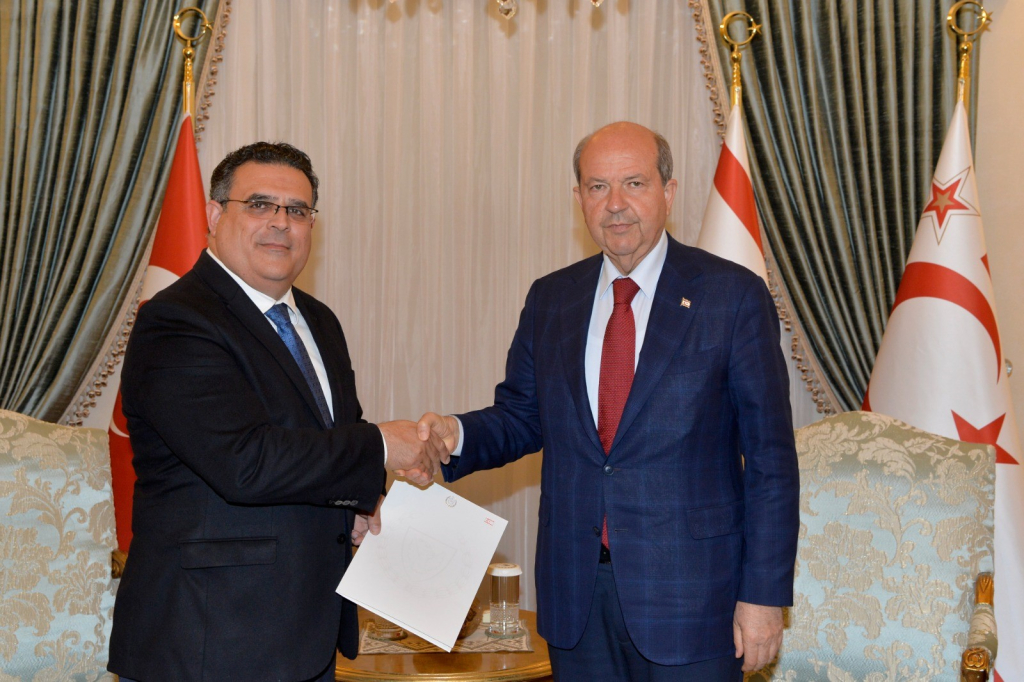The north is working to “create a reliable system in the field of higher education”, higher education accreditation authority (Yodak) chairman Aykut Hocanin said on Wednesday.
Speaking following a meeting with Turkish Cypriot leader Ersin Tatar, he said work is now underway to implement Turkey’s higher education information management system, Yoksis, in the north.
“With the new system, in addition to both local and foreign students being registered, issues such as student admissions, registration, operation of graduation procedures, and information on university faculty members, will all be controlled by Yodak,” he said.
Tatar said he is “closely following” the work being carried out to “develop higher education in the TRNC”, and that “it is important for the work to continue effectively and efficiently.”
Work to introduce the Yoksis system in the north began amid the “fake diploma scandal” which rocked the north in the first half of the year, with many degrees issued in the north reportedly having been fabricated, and a plethora of high-profile figures having been arrested for their alleged involvement in the scandal.
Police investigations centred on Morphou’s Cyprus Health and Social Sciences University (KSTU), with the university’s 30-per-cent shareholder and secretary-general Serdal Gunduz among those arrested.
Gunduz stands accused of preparing forged documents, putting them into circulation, and encouraging others to do the same.
He remains in custody to this day, having been ordered to remain behind bars for a further three months at his most recent court hearing on May 8, with the court in Morphou ruling that he was a flight risk as he holds residence permits in both Greece and Russia.
Meanwhile, former ‘education minister’ Kemal Durust was one of the many others arrested, having allegedly fraudulently obtained thousands of euros by sending fake invoices to the university in question.
Durust had been lambasted in ‘parliament’ by opposition party CTP ‘MP’ Sami Ozuslu for having signed off on the opening of a total of 16 universities during his three stints as ‘education minister’ between 2009 and 2016.
Ozsulu pointed out that it was Durust who signed off on the creation of the KSTU in 2016.
“The university which was opened with his permission later became his own office,” he added.
Durust’s wife, a high-level civil servant, was also one of those arrested, accused of having received a fake diploma.
With revelations continuing through the spring, Turkey’s higher education council (Yok) announced its intention to prepare a report on the state of the north’s education system.
The north’s ‘education minister’ Nazim Cavusoglu had said during a visit to the island by a delegation from Yok that he hopes the north can “turn this problem into an advantage”.
It is this report and the newfound cooperation between Yok and Yodak which is allowing for the Yoksis system to be rolled out in the near future, though Hocanin himself is not a figure who is immune from controversy.
He was appointed in March after his predecessor Turgay Avci resigned, having been accused alongside former Yodak board member Mehmet Hasguler of having taken bribes while the KSTU’s medicine school was applying for Yodak accreditation.
Tatar gave instructions to the north’s supreme court to fire Avci, and an investigation was launched, but Avci then immediately resigned of his own volition.
Hocanin stepped up to replace him, but his previous employment before being hired as Yodak chairman was as rector of the north’s largest public university, the Eastern Mediterranean University (EMU) in Famagusta.
He had suddenly resigned from that post just minutes before a university administration meeting was due to take place last September as the university had been engulfed in a financial crisis that summer.
University staff had been calling on Hocanin to resign after some claimed they had been paid less than €540 per month due to cost-cutting measures while the university ran at a budget deficit of 410 million TL – €14.2 million at the time.
Earlier in the summer, the university’s employees’ trade union Dau-Sen even threatened to take the university to court over unpaid wages, while its leader Ercan Hoskara warned that if measures were not taken, the university “could go the same way as KTHY”, the north’s airline which went bust in 2010.







Click here to change your cookie preferences